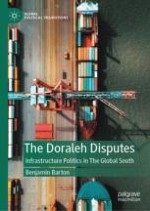2023 | OriginalPaper | Buchkapitel
4. The DCT: The Fractious Origins of a Geopolitically Sensitive Port Ecosystem
verfasst von : Benjamin Barton
Erschienen in: The Doraleh Disputes
Verlag: Springer Nature Singapore
Aktivieren Sie unsere intelligente Suche, um passende Fachinhalte oder Patente zu finden.
Wählen Sie Textabschnitte aus um mit Künstlicher Intelligenz passenden Patente zu finden. powered by
Markieren Sie Textabschnitte, um KI-gestützt weitere passende Inhalte zu finden. powered by
